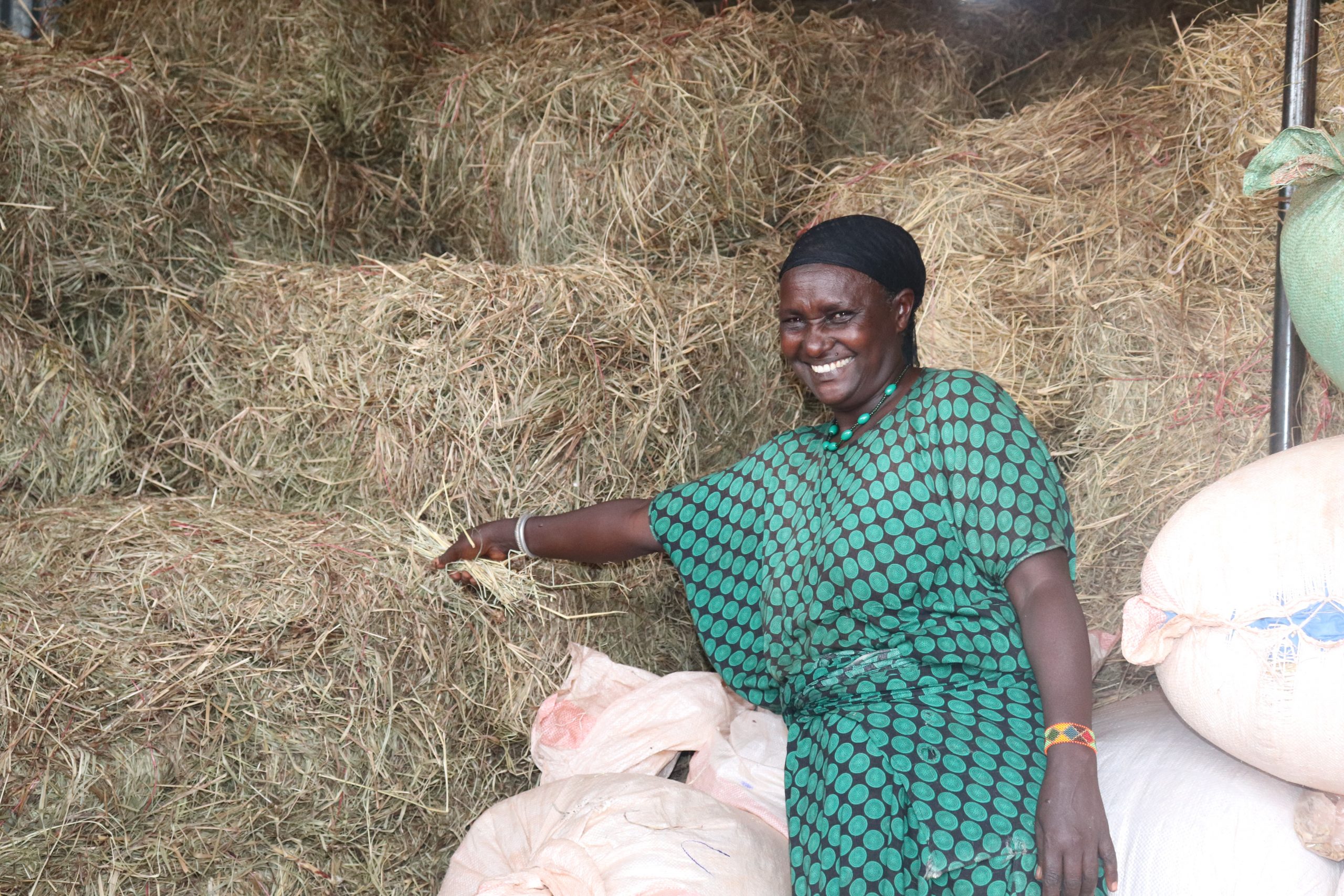
Jaldesa, Marsabit-Kenya: The front yard of Fatuma Molu’s home is a hive of activity. To the center left, green leafy kales sprout from a kitchen garden adjacent to a cows’ shed with mooing calves and a conspicuous silo-like structure with bales of fodder. At the bottom of a gentle slope beyond the compound lies a 10 acre fenced rangeland fodder- farm; visibly, a group of youth is preparing the land ready for another season of fodder planting.
Fatuma, 55 years and a widow is the chairperson of Jaldesa Sauti Moja Group – a community-based organisation with 40 members (38 female and 2 male). The group has found passion in fodder farming and its members are now reaping the benefits of selling hay and grass-seeds.
“We sell a bale of hay for Ksh 300 to non-members of the group and Ksh 250 to the members. Additionally, 1 Kg of grass-seeds goes for Ksh 1,000,” says Fatuma. She adds that the group has been able to harvest four times since the onset of the project, with the total yields in the year 2020 amounting to 320 bales of hay and 200 kilograms of grass-seeds.
With Ksh 40,000 savings in the groups’ bank account as of August this year, members are optimistic and anticipate even more cumulative investments in the future. Fatuma attributes the groups’ success so far to the frequent technical training they have received from Pastoralist Community Initiative and Development Assistance (PACIDA).
“With funding from Christian Aid, PACIDA has been working to build the resilience of communities against the effects of climate change, particularly the adverse effects of perennial drought in Marsabit region,” says Ibrahim Adan, the Programmes Manager at PACIDA. Ibrahim adds that community based groups such as Fatumas’ Jaldesa Sauti Moja, have already benefitted from frequent technical training on fodder production, hay conservation, fodder marketing and linkage with the pyramid of partnerships through which the program is being disseminated in Arid and Semi-Arad Lands of Kenya.
In partnership with Marsabit County government department of Agriculture Livestock and Fisheries, the trainings programs on fodder conservation are tailored to enable the group to be self-sufficient in fodder throughout the year. Besides, the group is trained on sustainable agricultural practices that withstand the harsh weather partners in the region.
Since its onset in 2017, the group has tremendous myriad support from PACIDA. In 2019, PACIDA facilitated the fencing of the 10-acre rangeland fodder farm to keep wild animals such as elephants at bay, hence reducing human-wildlife conflict. The group was also supported with a unique breed of grass-seeds that are drought-adaptive and offer high nutritional value to livestock.
Fodder farming-a well-thought after initiative Fodder farming has been lauded by the members as a well-thought initiative that has off-loaded the bulk of economic burdens that they were exposed to previously.
Most of the members having tried their hands in subsistence crop farming and rearing of livestock, but failed due to erratic climatic conditions in Marsabit region.
“In the last two decades, I have been engaged in maize farming on a subsistence scale but the returns have been meagre. Having ventured into fodder farming two years ago, I’m now earning a living from forage farming. I use the money to buy necessities for my Family,” Says Fatuma, adding that through the benefits reaped from the project they have been able to put up houses for two needy members and also pay school for their children.
Although the Jadesa Based group has beaten all the odds to emerge among some of the best fodder producers in a county attributed to adverse climatic conditions, their major challenge remains lack of a transportation mechanism to ferry bales of hay to customers from far-flung areas.
“We incur a lot of expenses while ferrying the fodder to our consumers who are mostly dairy farmers in Marsabit town, about 50 kilometres away. Transport costs have, however, reduced our profits,” she says.
The group has also bought watertanks for 20 of its members as plans are now underway to procure more tanks to the remaining members. Besides, individual members’ success, the group targets to acquire hybrid cattle for large-scale and commercial milk production as a means of business diversification and expansion.
For more information, write to: pacida@pacida.org or g.okoth@pacida.org
Visit Us
Marsabit Kenya
pacida@pacida.org
Call Us
+254 (0) 20 265 6947
About Pacida
The Pastoralist Community Initiative and Development Assistance (PACIDA) is a development and relief organisation that empowers pastoralist communities through sustainable community-driven development interventions.
PACIDA was founded in 2008 by local scholars and development practitioners who were concerned about the huge and widening humanitarian needs, deepening vulnerabilities and huge development gap in its target region.
Contact us
Postal Address: PO Box 333-60500, Marsabit, Kenya.
Email: pacida@pacida.org
Hotline: +254 (0) 20 265 6947